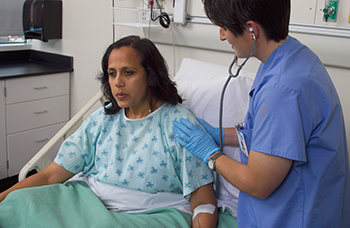Treating Pneumonia
Treating Pneumonia
Pneumonia is an infection of one or both of the lungs. Pneumonia:
Is usually caused by either a virus or a bacteria
Can be very serious, especially in infants, young children, and older adults. It’s also serious for those with other long-term health problems or weakened immune systems.
Is sometimes treated at home and sometimes in the hospital
Antibiotic medicines
Antibiotics may be prescribed for pneumonia caused by bacteria. They may be pills (oral medicines), or shots (injections). Or they may be given by IV (intravenously) into a vein. If you are taking oral medicines at home:
Fill your prescription and start taking your medicine as soon as you can.
You will likely start to feel better in a day or 2, but don’t stop taking the antibiotic.
Use a pill organizer to help you remember to take your medicine.
Let your healthcare provider know if you have side effects.
Take your medicine exactly as directed on the label. Talk to your provider or pharmacist if you have any questions.
Antiviral medicines
Antiviral medicine may be prescribed for pneumonia caused by a virus. For example, antiviral medicine may be prescribed for pneumonia caused by the flu virus. Antibiotics do not work against viruses. If you are taking antiviral medicine at home:
Fill your prescription and start taking your medicine as soon as you can.
Talk with your provider or pharmacist about possible side effects.
Take the medicine exactly as instructed.
To relieve symptoms
There are many medicines that can help relieve symptoms of pneumonia. Some are prescription and some are over-the-counter.
Your healthcare provider may recommend:
Acetaminophen or ibuprofen to lower your fever and to lessen headache or other pain
Cough medicine to loosen mucus or to reduce coughing
Make sure you check with your healthcare provider or pharmacist before taking any over-the-counter medicines.
Special treatments
If you are hospitalized for pneumonia, you may have other therapies, including:
Inhaled medicines to help with breathing or chest congestion
Supplemental oxygen to increase low oxygen levels
Drink fluids and eat healthy
You should eat healthy to help your body fight the infection. Drinking a lot of fluids helps to replace fluids lost from fever and to loosen mucus in your chest.
Diet. Make healthy food choices, including fruits and vegetables, lean meats and other proteins, 100% whole grain and low- or no-fat dairy products.
Fluids. Drink at least 6 to 8 tall glasses a day. Water and 100% fruit or vegetable juice are best.
Get plenty of rest and sleep
You may be more tired than usual for a while. It is important to get enough sleep at night. It’s also important to rest during the day. Talk with your healthcare provider if coughing or other symptoms are interfering with your sleep.
Preventing the spread of germs
The best thing you can do to prevent spreading germs is to wash your hands often. You should:
Rub your hand with soap and water for 20 to 30 seconds.
Clean in between your fingers, the backs of your hands, and around your nails.
Dry your hands on a separate towel or use paper towels.
You should also:
Keep alcohol-based hand cleaners nearby.
Make sure you also clean surfaces that you touch. Use a product that kills all types of germs.
Stay away from others until you are feeling better.
When to call your healthcare provider
Call your healthcare provider if you have any of the following:
Symptoms get worse
Fever continues
Shortness of breath gets worse
Increased mucus or mucus that is darker in color
Coughing gets worse
Lips or fingers are bluish in color
Side effects from your medicine
Updated:
October 17, 2017
Reviewed By:
Adler, Liora C., MD,Image reviewed by StayWell art team.,Sather, Rita, RN
